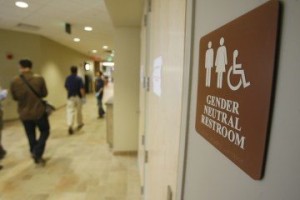
Transgender rights referendum reaches next step
by Lisa Leff
Associated Press

SAN FRANCISCO (AP) — Opponents of a new California law that spells out the rights of transgender students in public schools have cleared the next hurdle in their effort to repeal the law at the ballot box, state elections officials said Wednesday.
A spot check of petitions circulated by backers of a proposed voter referendum on the law showed enough were valid to trigger further review of the signatures needed to qualify the measure for the November ballot, according to figures compiled by the secretary of state.
Projections based on random sampling indicated that the referendum’s backers — a coalition of conservative groups called Privacy for All Students — obtained 95.6 percent of the 504,760 signatures required to force a public vote on the law passed last year by the California Legislature and signed by Gov. Jerry Brown.
That was only a few thousand more than they needed to prompt the next step in the qualification process — a full check of all 619,244 signatures submitted, the secretary of state’s office said.
It could take more than a month for that work to be completed. County election officials have until Feb. 24 to review the signatures gathered in their jurisdictions to see if they were obtained from properly registered voters and then to report their findings to the state.
If the referendum makes the ballot, the law will be put on hold until the election determines whether it survives or is repealed.
“We wait with anticipation as we move into the next phase of the referendum process,” Karen England of the Privacy for All Students coalition said in an email to supporters. “We feel confident that a full count will result in us securing 100% of the signatures needed to put this referendum on the ballot.”
The referendum would have made the ballot outright if the initial spot-check had shown that the signatures turned in for verification had a validity rate of 110 percent, which would have put them well over the minimum qualification target.
The law that is the subject of the referendum attempt took effect Jan. 1. It guarantees students in grades K-12 the right to use school facilities such as bathrooms and locker rooms and to participate in the sex-segregated activities that correspond with their expressed genders instead of their school records.
Supporters said it was needed to spell out protections that already exist under state anti-discrimination laws but are overlooked or improperly applied by educators fielding requests from transgender students and their families.
Opponents maintain it violates the privacy of youngsters who may be uncomfortable sharing facilities with classmates of the opposite biological sex.
Transgender Law Center Executive Director Masen Davis, whose Oakland-based nonprofit co-sponsored legislation that led to the law’s enactment, said he is confident the referendum will fall short of the ballot, but thinks voters will reject it if they are faced with the question in November.
“I think it’s really important people know this is not about co-ed bathrooms. This is about schools focusing on the needs of each student on a case-by-case basis so they can focus on school,” Davis said.
Some school districts around California, as well as the education departments in Massachusetts and Connecticut, have implemented similar policies by regulation. But California is the first state to detail the rights of transgender students in schools by statute.
Although the law’s opponents have focused on potential abuses and awkward encounters in bathrooms and locker rooms, schools preparing to implement the law also are evaluating what it means for yearbook photo dress codes, sleeping arrangements for overnight field trips and activities such as choirs and recreational sports where girls and boys are often separated.
The California Interscholastic Federation, which governs competitive high school sports, adopted a detailed process in 2012 that students must follow if they want to play on a team that is not consistent with their gender at birth.











Comments